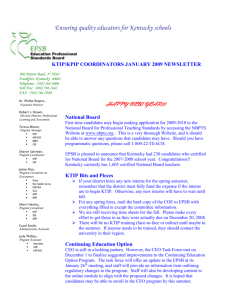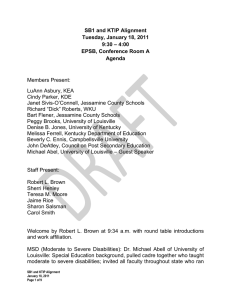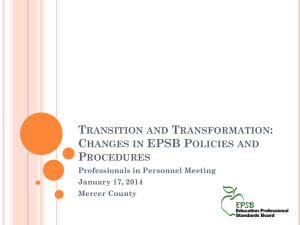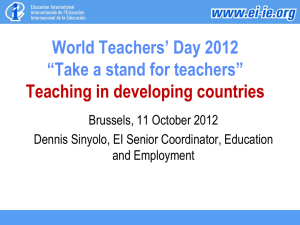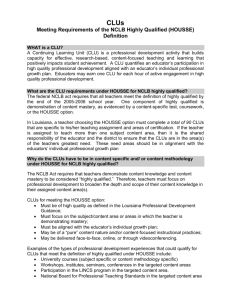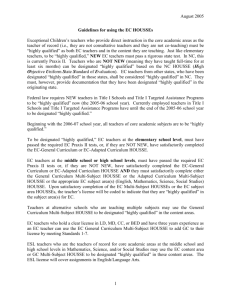NO CHILD LEFT BEHIND ACT - HIGHLY QUALIFIED TEACHER
advertisement
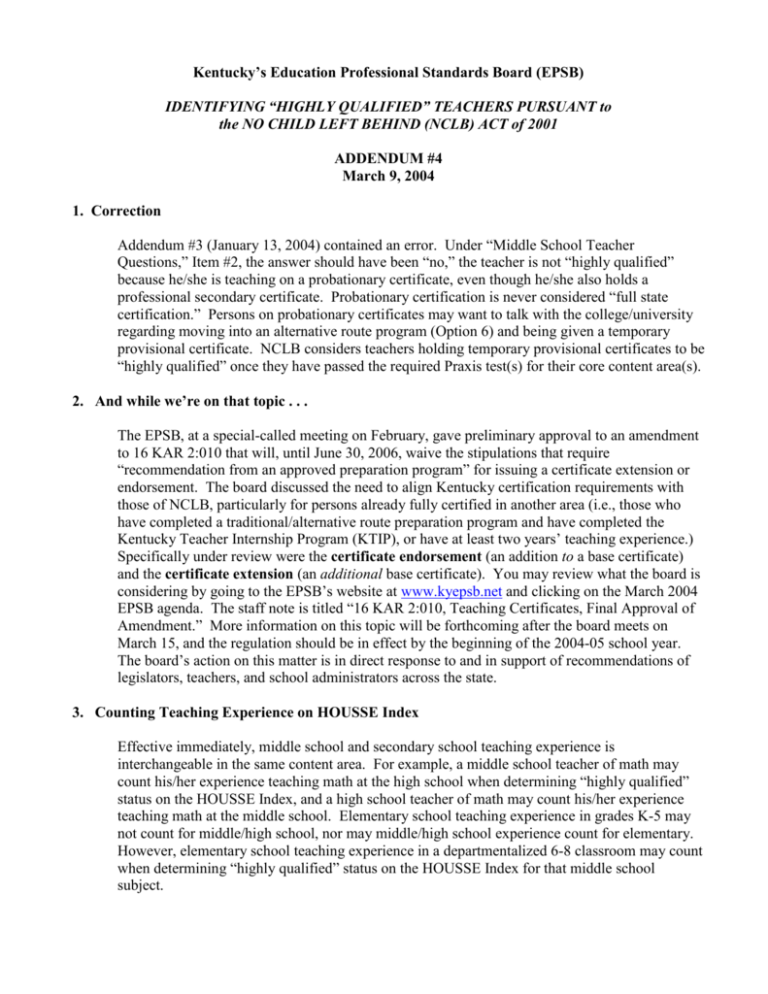
Kentucky’s Education Professional Standards Board (EPSB) IDENTIFYING “HIGHLY QUALIFIED” TEACHERS PURSUANT to the NO CHILD LEFT BEHIND (NCLB) ACT of 2001 ADDENDUM #4 March 9, 2004 1. Correction Addendum #3 (January 13, 2004) contained an error. Under “Middle School Teacher Questions,” Item #2, the answer should have been “no,” the teacher is not “highly qualified” because he/she is teaching on a probationary certificate, even though he/she also holds a professional secondary certificate. Probationary certification is never considered “full state certification.” Persons on probationary certificates may want to talk with the college/university regarding moving into an alternative route program (Option 6) and being given a temporary provisional certificate. NCLB considers teachers holding temporary provisional certificates to be “highly qualified” once they have passed the required Praxis test(s) for their core content area(s). 2. And while we’re on that topic . . . The EPSB, at a special-called meeting on February, gave preliminary approval to an amendment to 16 KAR 2:010 that will, until June 30, 2006, waive the stipulations that require “recommendation from an approved preparation program” for issuing a certificate extension or endorsement. The board discussed the need to align Kentucky certification requirements with those of NCLB, particularly for persons already fully certified in another area (i.e., those who have completed a traditional/alternative route preparation program and have completed the Kentucky Teacher Internship Program (KTIP), or have at least two years’ teaching experience.) Specifically under review were the certificate endorsement (an addition to a base certificate) and the certificate extension (an additional base certificate). You may review what the board is considering by going to the EPSB’s website at www.kyepsb.net and clicking on the March 2004 EPSB agenda. The staff note is titled “16 KAR 2:010, Teaching Certificates, Final Approval of Amendment.” More information on this topic will be forthcoming after the board meets on March 15, and the regulation should be in effect by the beginning of the 2004-05 school year. The board’s action on this matter is in direct response to and in support of recommendations of legislators, teachers, and school administrators across the state. 3. Counting Teaching Experience on HOUSSE Index Effective immediately, middle school and secondary school teaching experience is interchangeable in the same content area. For example, a middle school teacher of math may count his/her experience teaching math at the high school when determining “highly qualified” status on the HOUSSE Index, and a high school teacher of math may count his/her experience teaching math at the middle school. Elementary school teaching experience in grades K-5 may not count for middle/high school, nor may middle/high school experience count for elementary. However, elementary school teaching experience in a departmentalized 6-8 classroom may count when determining “highly qualified” status on the HOUSSE Index for that middle school subject. 4. Defining Core Academic Subjects English/Reading/Language Arts: Based on guidance recently provided by the U.S. Department of Education (USDOE), for NCLB purposes the following courses are not considered to be part of the English/Reading/Language Arts core content – speech, journalism, yearbook, drama, theater, and debate. Therefore, teachers of these courses do not need to meet the “highly qualified” requirements. History/Civics/Government/Economics/Geography: Based on guidance recently provided by the USDOE, for NCLB purposes the following courses are not considered to be part of the History/Civics/Government/Economics/Geography core content – sociology, psychology, and humanities. Therefore, teachers of these courses do not need to meet the “highly qualified” requirements. 5. Special Education Teachers and KTIP The USDOE continues to debate what should be the “highly qualified” requirements for special education teachers, and Secretary Paige stated on February 20, 2004 that he will be issuing “more flexible interpretation of the requirement that all students be assigned a fully qualified teacher.” Given the uncertainty of this situation, a liberal interpretation of KTIP as it applies to special education will be used. Specifically: In elementary school, a special education teacher who has completed KTIP in a resource, departmentalized, or self-contained elementary school special education classroom is deemed to have met the HOUSSE KTIP requirement for being “highly qualified” to teach elementary exceptional children in his/her special education certification area in a resource, departmentalized, or self-contained classroom. In middle school, a special education teacher who has completed KTIP in a resource, departmentalized, or self-contained middle school special education classroom is deemed to have met the HOUSSE KTIP requirement for being “highly qualified” to teach the core academic subject(s), for which documentation of KTIP observations and evaluations exists, to middle school exceptional children in his/her special education certification area in a resource, departmentalized, or self-contained classroom. In secondary school, a special education teacher who has completed KTIP in a resource, departmentalized, or self-contained secondary school special education classroom is deemed to have met the HOUSSE KTIP requirement for being “highly qualified” to teach the core academic subject(s), for which documentation of KTIP observations and evaluations exists, to secondary school exceptional children in his/her special education certification area in a resource, departmentalized, or self-contained classroom. 6. Notifying Parents Districts should contact the Kentucky Department of Education (KDE) for information regarding the NCLB parental notification requirements. Inquiries may be sent to Diane Robertson @ droberts@kde.state.ky.us. 7. HQ Calculator The EPSB’s HQ Calculator has been improved – in no small measure because of school teachers’ and administrators’ recommendations. Thank you. If any teachers have not yet used the calculator to determine if they are “highly qualified,” or if any teachers experienced difficulty using the old calculator, they should visit the EPSB’s web site at www.kyepsb.net and click on the HQ Calculator. 8. HQ Report for KDE The EPSB has developed the HQ Report web application for collection of who is “highly qualified” this year. This report will be used by KDE to in turn report to the USDOE. Information is gathered by school, so each school will have to complete it. Principals will have access rights to the application, so if they share their password and user ID with someone, the latter will have access to all applications the principals can access – e.g., resource teacher timesheets, internship reports, social security numbers. Care should be taken to protect these access rights. KDE will determine when the HQ Report web application is sent to districts, and has stated that next year the HQ Report will be compiled via STI. Questions regarding the above information or suggestions as to how we may be of assistance should be directed to Dr. Phillip Rogers at phillip.rogers@ky.gov.
